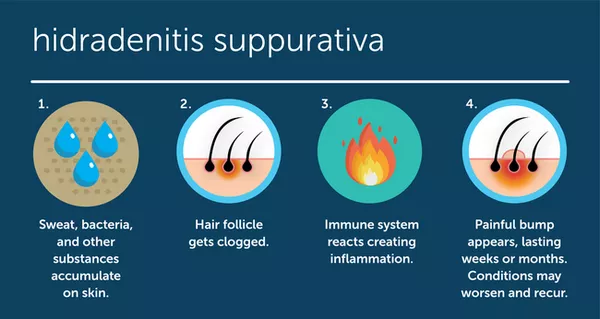Hidradenitis Suppurativa (HS) is a chronic skin condition characterized by painful lumps, abscesses, and nodules in areas where skin rubs together, such as the armpits, groin, buttocks, and under the breasts. While the exact cause of HS remains unclear, various factors, including genetics, hormones, and lifestyle choices, may contribute to its development and exacerbation. Among these factors, diet plays a significant role in managing HS symptoms and flare-ups. Understanding which foods to avoid can be crucial for individuals seeking to alleviate the discomfort and reduce the frequency of HS episodes.
The Link Between Diet and Hidradenitis Suppurativa
Although research on the relationship between diet and HS is still evolving, emerging evidence suggests that certain foods may trigger inflammation and worsen HS symptoms. While dietary changes alone may not cure HS, they can help in managing the condition by reducing inflammation and potentially minimizing flare-ups.
Inflammation is a key driver of HS symptoms, and certain foods have been found to exacerbate inflammation in the body. By avoiding these trigger foods, individuals with HS may experience a reduction in the severity and frequency of symptoms.
Foods to Avoid with Hidradenitis Suppurativa
1. Dairy Products:
Dairy products, including milk, cheese, and yogurt, are commonly associated with inflammation and may exacerbate HS symptoms for some individuals. Dairy contains casein and whey, two proteins that can trigger inflammation and worsen skin conditions. Furthermore, dairy products may also disrupt hormonal balance, which can contribute to HS flare-ups.
2. Processed Foods:
Processed foods, such as fast food, pre-packaged snacks, and sugary beverages, often contain high levels of refined carbohydrates, unhealthy fats, and additives. These ingredients can promote inflammation in the body and may aggravate HS symptoms. Additionally, processed foods are low in nutrients and high in calories, contributing to weight gain, which is a risk factor for HS.
3. Nightshade Vegetables:
Nightshade vegetables, including tomatoes, potatoes, eggplants, and peppers, contain solanine, a compound that some individuals may be sensitive to. Solanine has been linked to inflammation and may exacerbate symptoms in people with autoimmune conditions, including HS. While not everyone with HS reacts negatively to nightshade vegetables, it may be beneficial to eliminate or reduce their consumption to see if symptoms improve.
4. High-Glycemic Index Foods:
Foods with a high glycemic index (GI) can cause rapid spikes in blood sugar levels, leading to increased inflammation in the body. High-GI foods include white bread, white rice, sugary cereals, and sweets. These foods can disrupt insulin levels and promote the release of pro-inflammatory cytokines, worsening HS symptoms. Opting for low-GI alternatives, such as whole grains, legumes, and vegetables, can help stabilize blood sugar levels and reduce inflammation.
5. Red Meat and Processed Meats:
Red meat, such as beef, lamb, and pork, contains saturated fats and advanced glycation end products (AGEs), which have been linked to inflammation and oxidative stress in the body. Processed meats, such as bacon, sausage, and deli meats, often contain additives and preservatives that can trigger inflammation and worsen HS symptoms. Instead of red and processed meats, individuals with HS can choose lean protein sources, such as poultry, fish, tofu, and legumes.
6. Gluten-Containing Foods:
Gluten is a protein found in wheat, barley, rye, and their derivatives. Some individuals with HS may have gluten sensitivity or celiac disease, which can exacerbate inflammation and contribute to skin flare-ups. While more research is needed to establish a direct link between gluten and HS, some people report improvement in symptoms after eliminating gluten from their diet. Opting for gluten-free alternatives, such as quinoa, rice, and gluten-free grains, may be beneficial for individuals with HS.
Conclusion
While dietary changes alone may not cure Hidradenitis Suppurativa, they can play a significant role in managing symptoms and reducing flare-ups. By avoiding trigger foods that promote inflammation, individuals with HS can potentially alleviate discomfort and improve their overall quality of life. However, it’s essential to remember that dietary recommendations may vary from person to person, and consulting with a healthcare professional or registered dietitian is advisable before making significant dietary changes. With a comprehensive approach that includes proper medical treatment, stress management, and a healthy diet, individuals with HS can better navigate the challenges posed by this chronic skin condition.

























